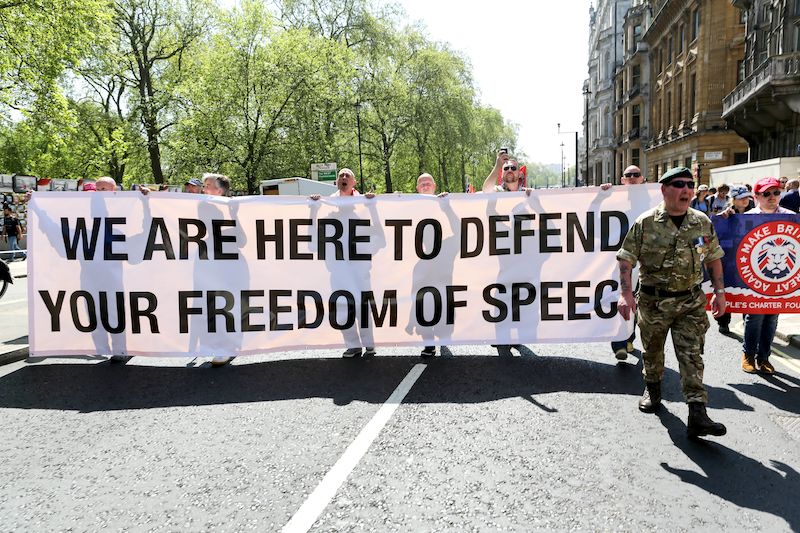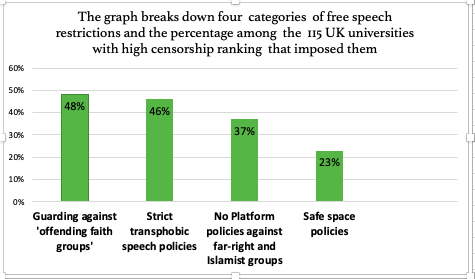The government’s plan to appoint “free speech and academic freedom champions” may reverse the trend of deplatforming and disparaging academics for their controversial views on university campuses.
The champion will monitor and impose sanctions on universities that silence speakers or rescind their invitations to academics whose views are deemed offensive or insensitive.
“The measures announced by the education secretary…will provide a much-needed legal remedy to boost students and lecturers whose free speech rights have been breached,” said Toby Young, a journalist and the founder of the Free Speech Union, which describes itself as a non-partisan advocacy group for freedom of speech.
“We hope they will help to protect academic freedom and allow for rigorous intellectual debate of material that at times can be irritating, contentious, eccentric, heretical and even provocative.”
Young commended the new measures which he said would “extend the duties of universities to protect free speech to student unions and stop students activists from non-platforming their political opponent and those whose views they disagree with or simply dislike.”
The new scheme, according to education secretary Gavin Williamson, will allow deplatformed academics to sue universities that habitually restrict freedom of speech and help to counteract “unacceptable silencing and censoring” in universities.
Alliance for Academics for Academic Freedoms (AFAF) compiles an up-to-date list that fleshes out the most controversial incidents of de-platforming speakers, instances of ostracisation or “cancelling” of academics.
One prominent example is Kathleen Stock, a professor of philosophy from the University of Sussex and a holder of the OBE, who was pilloried by over 600 academics for her alleged “trans-exclusionary public and academic discourse”. They urged the authorities to deprive her of the OBE award.
Another deplatformed speaker was former home secretary Amber Rudd whose invitation to speak at Oxford University was withdrawn at the last minute. The United Women Oxford Student Society that prompted her withdrawal took issue with her “dubious views” on transgender rights.
According to a Telegraph report, university speakers and academics with gender-critical stances were the most frequent target of intimidation and permanent bans.
Prominent scientist Richard Dawkins was deplatformed following an invitation to talk in the College Historical Society at Trinity College this September. The reason for retracting the offer was his problematic views on sexual assault and Islam.
As the AFAF list demonstrates, one of the hallmarks of 2020 was censoring the dead. Edinburgh University, for instance, is poised to rename a building named after David Hume, a prominent 19th-century empiricist philosopher, due to his “racist” comments and links to the slave trade. Similarly, the name of playwright Bernard Shaw will be eviscerated from the Royal Academy of Dramatic Art for his alleged fascist sympathies.
Erodes “institutional autonomy”
However, some voices from The National Union of Students frame the plan as unnecessary and “bureaucratic” intrusion as it may erode the “institutional autonomy” of universities and prompt excessive policing which will achieve the opposite of the intended effect.
Harry Walker, president of Free Speech Society at Bristol University, said: “There is a risk that new appointments will be counterproductive because the government will get involved in such a direct manner.
“Regarding the deplatforming phenomenon, I don’t think the way it’s presented by the government in this ‘free speech champions’ context is realistic.
“The majority of deplatformed speakers were barred because of security risks. Now universities won’t be able to provide an adequately secure environment if some controversial speaker will garner a lot of protesters.
“The government officials shouldn’t crack down on this unless they can fortify security measures to forestall violence.”
As under the new plan, all universities must stick to strict freedom of speech codes, damages sought by deplatformed speakers could cause financial problems for institutions.
The Russell Group criticised the government’s heavy-handed approach and alluded to scant evidence for severe restrictions on freedom of expression.

Research by Spiked Online reveals that Russell Group institutions were the most common offenders when it came to freedom of speech restrictions.

Civitas research mirrors this trajectory, showing that 42 per cent of red brick universities were ranked as most restrictive for censorship in a traffic-light system, with sanctions against controversial speakers ranging from outright bans to intimidation.
Their top position in the list of the high-concern “red” universities indicates their failure to comply with academic freedom protocols. Four of the most restrictive institutions are Cardiff, Edinburgh, Newcastle and the University of Oxford.
On the other hand, universities with a lower ranking in academic excellence and research fared markedly better.
For instance, Glasgow Caledonian University, University of Hertfordshire, Robert Gordon University fall in the “green” zone which denotes their “laissez-faire” approach when dealing with controversial speakers.





